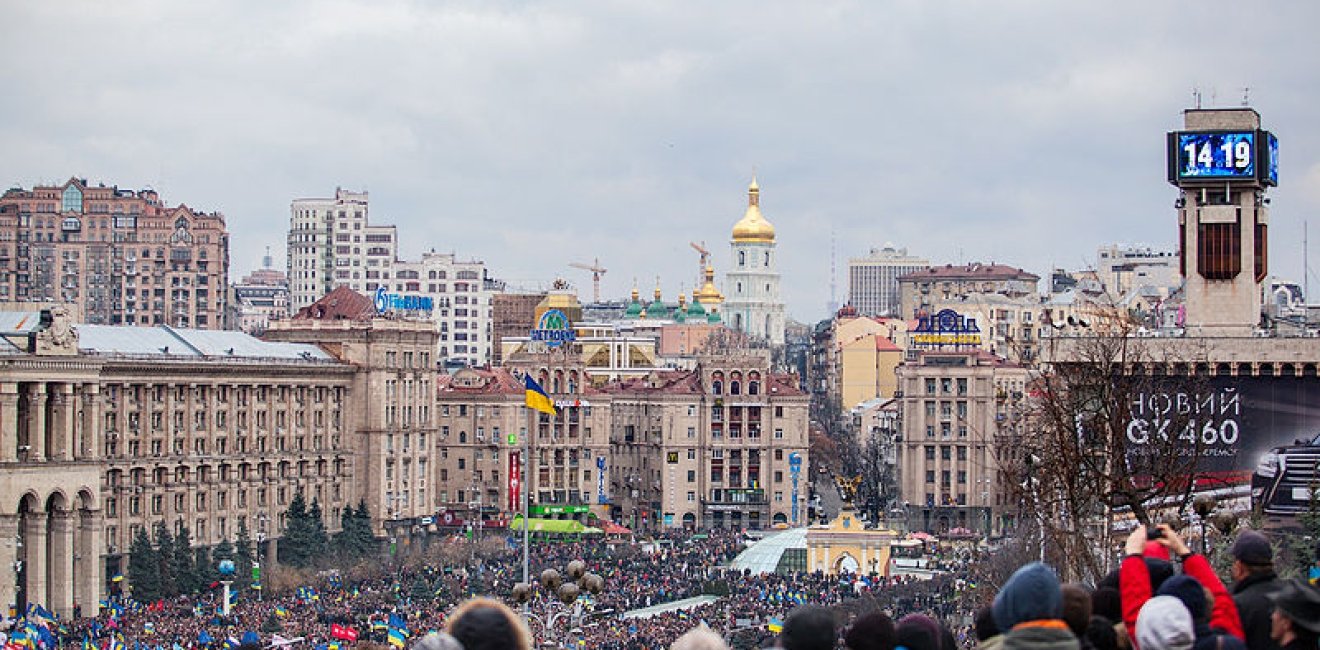
A blog of the Kennan Institute
BY MYKHAILO MINAKOV
Five years ago, civic protests against the government’s decision to withhold from association with the European Union began in Kyiv. These events evolved into Euromaidan, an event that changed Ukraine and international order in the region.
But how can this change be measured?
To get the answer, I asked scholars of Ukrainian culture in Europe and the United States the question, “What is the significance of Euromaidan for Ukraine and Europe?”
Their answers to this question are below.
George G. Grabowicz, Dmytro Chyzhevs’kyj Professor of Ukrainian Literature, Harvard University (USA)
In terms of the larger picture, the significance of the Euromaidan, or generally the Maidan, of 2013-14 can hardly be overstated: it not only caps the period of hybrid post-Soviet existence initiated by independence in 1991, but also provides a kind of closure to the complex and drawn-out process of Ukrainian nation-formation that began in the 19th century.
The Ukraine that emerged from the Maidan and the resultant Russian response—the annexation of Crimea in 2014 and the ongoing war in the Donbas—is arguably fundamentally different from both Soviet Ukraine of 1922-1991 and the first stage of post-Independence Ukraine (1991-2013). That difference can be measured in various ways. Most frequently discussed is the political or geopolitical factor; in effect, Ukraine’s shift from “unaligned,” or “multi-vectored” to a clearly pro-European and hence a pro-democratic official self-designation (including ongoing efforts to join the EU and NATO).
Underlying it are more significant tectonic shifts: the emergence of civil society and the growing recognition—precisely in society and not just among some real or putative elites—that a prerequisite for participation in both Europe and democracy is the rule of law. The fact of such “recognition,” however, i.e., its presence in various forms of social discourse, does not mean immediate implementation; impeding it, of course, is almost a whole century of Soviet and post-Soviet “crypto-law,” or authoritarianism/totalitarianism (“diktat” and “proizvol”) masquerading as rule of law.
The shift from the simulacrum to the real thing will clearly take time, especially implementation through institutions—which themselves need to be created or “discovered.” Subtending this is the central factor of identity: specifically, whether Ukraine and “Ukrainianness” are imaginable without Russia. For Lenin it was not, as the last remaining Kyiv monument to him loudly asserted; but the Maidan brought it down—and hundreds of such effigies all across Ukraine. That was on the surface, but also deeply symbolic. The attempts to free the Ukrainian Orthodox church from its subservience to the Moscow Patriarchate are still ongoing—but now are supported by the state. Corruption still remains (and not only in Ukraine).
Giovanna Brogi, Professor Emeritus in Slavic Studies and Literature, State University of Milan (Italy)
Whatever complications Ukraine has today, I am convinced that the events of 2013-2014 will remain a glorious event in its history.
Events in Ukraine reflect general global trends in an original, often paradoxical way. Euromaidan demonstrated that the seemingly dormant society under Yanukovych collected an enormous potential of opposition, and that this opposition was able to manifest its strength without aggression. The Maidan participants in Kyiv and in other parts of Ukraine showed excellent capacity of organization and unusual cold blood and pragmatism: in my view, this is the beginning of a new way of approaching socially and politically difficult situations in the Ukrainian reality.
True, the aftermath of the Maidan was often frustrating. Many requests proposed by the Revolution of Dignity have not yet been satisfied. The acting government(s) were not always able to actualize the ideas promoted by Maidan in tangible political terms. In my opinion, this is physiological in any “revolutionary” movement. Let us be content with the extraordinary fact that the Maidan revolution did not evolve into violence and terror from the inside–violence came from outside.
The annexation of Crimea and the subsequent—still ongoing—war in Eastern Ukraine represent the most tragic events in Europe after 1989, comparable only to the Balkan Wars in the 1990s. Unlike the Balkan situation, paradoxically, the tragic events and war of 2014-2018 may have contributed to the crystallization of a new sense of nationhood in Ukraine. True, difficulties are enormous: the existing government(s) are far below expectations; contrasts are strong between different social layers; and cultural backgrounds of large groups coming from different historical, linguistic and economic contexts. Still, I am convinced that in the last four years Ukrainians have learned to face the hard, long-lasting, often frustrating, but inevitable and necessary “everyday work” of forging one’s own identity and social cohesiveness with much more endurance and pragmatism.
To sum up, I am convinced that Maidan contributed strongly to bolster development of Ukrainian society and integrate it with Europe.
Olena Betlii, Associate Professor in History, National University of Kyiv-Mohyla Academy (Ukraine)
“We are going to die for ourselves and for Europe”: this formula, tested in Budapest in 1956 and Prague in 1968, became the essence of the winter events in Kyiv in 2013-2014. Thus, the events themselves, their mythology, philosophy, and perception were purely European in their nature. Hardly could one find other examples of such readiness to die for a continent understood as an idealistic idea of exclusive collective identity as those which were demonstrated by people in Maidan.
The Ukrainians definitely fueled the story of Europe with unprecedented examples of sacrifice, and in doing so they actually made the whole idea of Europe alive again. That was a wake-up сall for our continent—a moment which clearly demonstrated that there is something more that connects Europe. And that connection is not so much about the EU, Copenhagen criteria, or endless discussions about one’s Europeanness.
What one can observe analyzing Ukraine in the winter of 2013-2014 is not only a fight for an abstract Europe, but a fight for very practical outcomes: liberty, equality, fraternity. We went to Maidan in late November because our own freedom was everything we were left with and it was in danger. We protected it. We started the fight with the corrupted Yanukovych regime, and its dismantling led us to restart the transformation period based on rule of law and state building. Finally, we discovered fraternity. Unprecedented eagerness to protect and support each other during Maidan and the first years of ongoing war with Russia became the most important feature of Ukrainian collective identity revealed during the most tragic events of the contemporary history of Ukraine.
All of that was significant for both Ukraine and for Europe.
Denys Kiryukhin, philosopher, Research Fellow, The Skovoroda Institute of Philosophy, The National Academy of Sciences of Ukraine (Ukraine)
It would be no exaggeration if I were to say that Euromaidan became the most important political event for Ukraine since it gained independence in 1991, the event that determined the direction of the state’s development for many years to come. This is mainly because Euromaidan solved the difficult Ukrainian dilemma of choosing between an orientation toward the European Union and staying in Russia’s orbit. Today, no political force can achieve a rejection of the “European choice” since such a rejection requires a significant change in legal norms and political institutions, as well as a radical revision of international obligations. But no less important is the change in the role of civil society in the Ukrainian political system. Euromaidan showed that civil society was mature enough to organize and mobilize for protest. As a result, the state power in Ukraine finds itself in a situation where it is forced, if not to cooperate, then at least not to be in a state of conflict with civil society, since such a conflict threatens to undermine its legitimacy.
On the other hand, Euromaidan revealed that civil society did not have—and still does not have—the necessary resources to effectively neutralize those threats to the democratic development of the state, which are still present in such post-Soviet countries as Ukraine. The protests of 2013–2014 united and legitimized various political forces, from liberal to radical right. As a result, radical political forces and radical points of view became integral parts of the Ukrainian political process. This is a serious challenge for Ukraine’s democracy and the “European choice."
Finally, the Euromaidan accumulated contradictions in the system of relations between the EU and Russia. These protests have become a challenge for European “Russian policy” and the logic of European development. It is obvious, for example, that the Eastern Partnership policy does not satisfy those aspirations for integration into the European legal, political, and economic space that Ukraine is proposing. Unfortunately, Ukraine still does not have a clear prospect of joining the EU.
In a sense, Euromaidan is not yet ended. It has started the transformation processes in Ukraine, and only by the results of these processes will we be able to adequately assess its significance and role.
***
The Euromaidan legacy continues to be a topic of active discussion in Ukraine and in the West. I hope that these assessments can uncover ways Ukraine and Europe have changed over time, as well as enhance broader debates on this topic for a deeper understanding of Euromaidan’s legacy.
Author


Kennan Institute
After more than 50 years as a vital part of the Wilson Center legacy, the Kennan Institute has become an independent think tank. You can find the current website for the Kennan Institute at kennaninstitute.org. Please look for future announcements about partnership activities between the Wilson Center and the Kennan Institute at Wilson Center Press Room. The Wilson Center is proud of its historic connection to the Kennan Institute and looks forward to supporting its activities as an independent center of knowledge. The Kennan Institute is committed to improving American understanding of Russia, Ukraine, Central Asia, the South Caucasus, and the surrounding region through research and exchange. Read more

Explore More in Focus Ukraine
Browse Focus Ukraine
Talking to the Dead to Heal the Living

Ukrainian Issue in Polish Elections


